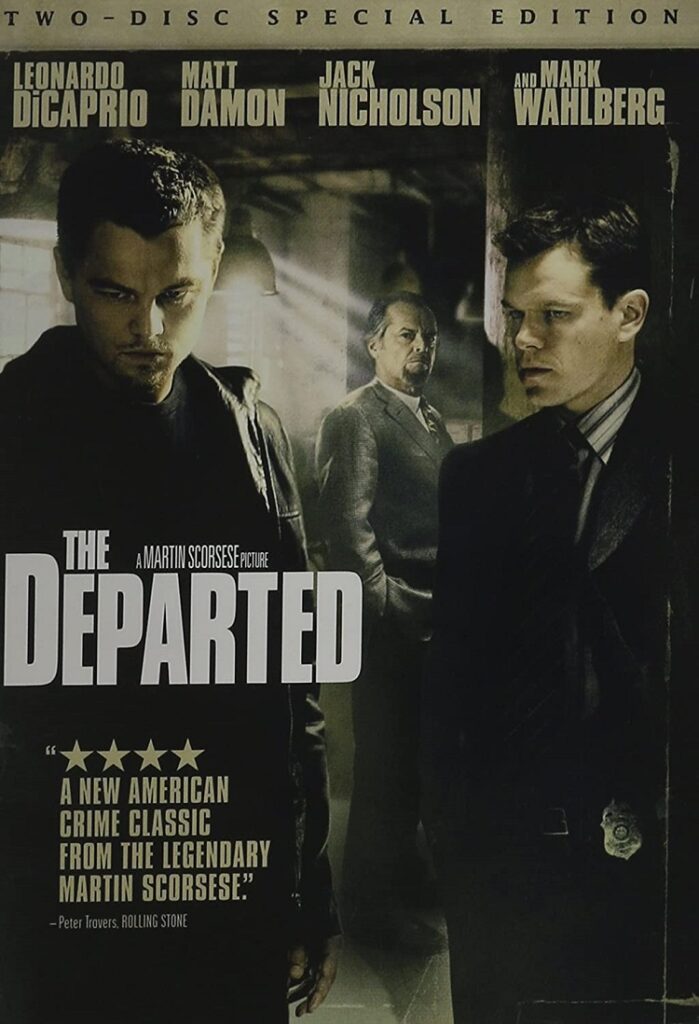
The Departed is an entertaining crime drama that Martin Scorsese refers to as his B-Movie, in part, because it was influenced by Warner Brothers’ 1930s gangster movies. While his welcome return to America’s mean streets finally won him an Oscar, all serious film aficionados and Scorsese fans know an asterisk needs to go into the record books because the Best Director and Best Picture awards were really bestowed to give the Academy credibility for their embarrassments of not awarding those honors to his previous works Raging Bull and Goodfellas. The Departed is good, but it doesn’t rise to the level of best.
Adapted from the 2002 Chinese film Infernal Affairs, screenwriter William Monahan, who also won an Oscar for his work on the film despite the gaping plot holes, transports the cops-and-robbers game of espionage from Hong Kong to South Boston. The story focuses on main characters Billy Costigan (Leonardo DiCaprio), an undercover officer, and Colin Sullivan (Matt Damon), a mole for gangster Frank Costello (Jack Nicholson), as they infiltrate the other’s organization and work to keep their cover. Their similarities are intriguing because their paths could easily have been reversed due to their backgrounds, which is what allows them to cross worlds so easily.
The movie had many good scenes as well as a number of surprising-yet-believable plot twists; however, the story doesn’t always hold up upon examination. After graduation from the police academy, Sullivan gets into Costello’s car in broad daylight and meets him later in the film, even though the police know Costello has a mole working for him. Not what you would expect from people trying to keep a secret that they are working together. Sullivan discovers a rat in Costello’s crew. Costigan is the new guy, but they can’t figure it out. When they test him, it’s so obvious that there’s no way Costigan would have fallen for it. One gangster who has been fatally shot tells Costigan he knows he is a cop, but doesn’t say anything to the gang before he dies. Why he wouldn’t, especially after he was just shot by cops, makes no sense. Too many times, characters’ intelligence is sacrificed to move the plot along or to create an interesting scene.
The cast delivers a lot of very good performances. My favorites were the supporting roles of Mark Wahlberg, the foul-mouthed Sergeant Dignam, and Alec Baldwin, the careerist Captain Ellerby. They have great dialogue and are fun to watch as they take over the scenes and become the focal points. The best I’ve seen Wahlberg do and I would place this a close second to Glengarry Glen Ross for Baldwin.
I did have issue with Nicholson at times because Scorsese didn’t reel him in as often as he needed. There were great moments, like the scene where Costello and Costigan are sitting at the table and while listening to Costigan, he drops a gun he had been holding under the table; a great reminder of the character’s potential and thought process. However, the scenes with the dildo at the porn theater and his making faces when talking about the rat were over the top and took me out of the moment as Jack was being Jack. I understand he was trying to create a sense of being slightly insane and a loose cannon, but he missed the mark, acting crazy rather than being crazy like Joe Pesci in Goodfellas and Casino.
The second disc contains a number of great features, but they don’t make up for the omission of a director’s commentary track. Scorsese is a film encyclopedia and could talk for hours about his craft, which he has done on other DVDs and his brilliant documentaries A Personal Journey with Martin Scorsese Through American Movies and My Voyage to Italy. Instead, his thoughts related to the film are only available in interviews from the features and his discussing nine deleted scenes.
“Stranger Than Fiction: The True Story of Whitey Bulger, Southie, and The Departed” presents the story of the man Nicholson’s character was loosely based on. Monahan was born in Boston so he knew of Bulger. Many people offer their thoughts and recollections, from Scorsese and the cast to reporters, police, and former members of the gang. While the story is compelling, some of the camera work in the interviews is horrendous. I have no idea what directors Barbara Toennies and Gidion Phillips were thinking with the pointless zooming, the floating handheld camera, and the cuts to close-ups of people’s hands. Of course, they didn’t pull that nonsense when Scorsese was being interviewed. From the same interviews, “Crossing Criminal Cultures” examines how gangster films and growing up in Little Italy influenced Scorsese and his work.
A great extra is the inclusion of the feature-length Turner Classics Movies’ Scorsese on Scorsese, a self-examination of his career. Similar to the book of the same name, Scorsese discusses almost all his films. Of course, he covers the classics, and there’s only so much that could be covered to maximize the commerciality of the project, but I would have liked to have heard his reaction to some of his misfires. An artist can only fail if he’s taking chances and his reaction to the misfires would be very interesting. Still, there’s a lot of great insight to the man and his body of work that it makes the DVD a must-have. I would have bought it if it had been released separately.